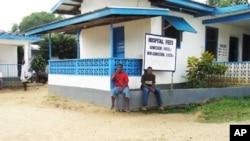It’s a typical day at the E.S. Grant Hospital - Liberia’s sole psychiatric institution. A young man has just been admitted and is having an epileptic fit. People are gathered round him, including his Mamie Kwaleh. She’s clearly at her wits end frustrated by her inability to find a traditional cure.
“That's my first son.. I made some country medicine for him. Now, I’m tired,” Kwaleh says.
A hospital attendant remarks it’s good she brought him to the hospital, because now he can be helped.
An immense impact
At the far end of the courtyard, a group of patients enjoy a therapeutic singing session. The hospital is run on behalf of the Ministry of Health by Cap Anamur, a German non-governmental organization. Christine Veldink, the hospital coordinator, says a few smaller organizations offer counseling to women victims of rape, but only Cap Anamur and the French organization Doctors Without Borders provide comprehensive mental health care in Liberia.
He says, “we are the only ones who are treating …the severe mentally ill: the really psychiatric patients with severe depressions, with psychosis [or] with bipolar disorders."
The small psychiatric hospital has nurses, but no doctors. Medications sometimes run out. But despite these shortcomings, its impact is immense.
That’s a 14-year-old young psychiatric patient named Handful. She earned her name, because at birth she could be held in one hand. She says she misses her mommy.
Handful is being treated for depression. Much has gone wrong in her short life. She’s been sexually abused and abandoned by her mother. She’s had to live on the streets selling her body to survive. Medical staffs say once she’s well, Handful will go to an orphanage for girls.
“We are now treating her for a short time, and then she goes to a home for girls. We don’t know if she is going to stay there, because she’s been there before and she runs away every time," says hospital coordinator Christine Veldink. "She doesn’t really understand that she has to stay in one place to be safe. So we don’t know.”
Addiction to drugs
Nurses at E.S. Grant hospital say most of the cases they treat are linked to drug addiction These are cases similar to that of 29-year old Prince Kamara.
Prince Kamara suffered a drug induced psychosis just before he was admitted to a hospital.
“I started fighting. They injected my two legs and four days before I come to myself,” he says.
Dr Benjamin Harris, Liberia’s sole psychiatrist, says there is a growing problem of drug addiction linked to mental illness among the young.
“The studies show that 27 % of the individuals surveyed had had substance abuse related problems and substance abuse issues are a growing problem in Liberia. Unless something is done pretty quickly to try to address this problem, it is bound to get worse," he says.
But things are getting better for Prince Kamara, and he is grateful to the staff of the E.S. Grant hospital.
He says now he is feeling well and thanks all who took care of him.
Prince Kamara is one of the lucky few to access treatment. Harris says the number of people with mental health issues in Liberia is alarmingly high.
“There’s only one major study that has been done, and this is also a survey of 1,600 households in Liberia," says Harris. "The figures that have been derived from that study show that about 43% of the individuals surveyed meet the diagnostic criteria for serious depressive illness major depressive disorder and about 43% for post traumatic stress disorder. So these are alarming figures."
A ray of hope
After years of lobbying, Harris has finally managed to get the government to add mental health to the overall health planning process.
The result is the recent launch of a new mental health plan produced with the support of the World Health Organization. The plan focuses on community based care, increased training of medical personnel and the reform of the system for allocating prescription drugs.
Emmanuel Ballor, a mental health counselor at E.S. Grant hospital, says the new effort offers hope.
“[As for] the portion I have read, I think if everything will be [be brought to a practical level]. It’s going to work. Because they try to open a few beds in general hospitals and then this becomes the official referral source. So when we have those established in the various hospitals in the counties, I think that can help to reduce some of these problems," Ballor says.
Dr. Peter Clement of the World Health Organization says the policy provides a framework for reform.
“The plan is derived from the policy that is based on the situational analysis in the country. What are the real needs at the moment and guiding the ministry within the next maybe five years to come up with clear approaches to really addressing the issue of mental health,” says Clement.
With the launch of a mental health plan the next challenge for the government of Liberia is raising funds to implement it.










